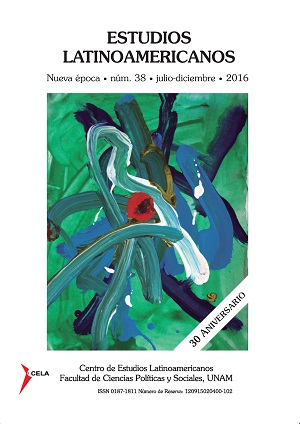A Critique to the Political Economy of “XXI Century Socialism”: private sector takeover of oil revenue, import policy and capital outflow
Main Article Content
Abstract
Downloads
Article Details
Citas en Dimensions Service
References
BANCO CENTRAL DE VENEZUELA (BCV) (2011), 10 de octubre. Dirección URL: <http://www.bcv.org.ve/EPF0809/epf.html>.
BANCO CENTRAL DE VENEZUELA (2014), 21 de mayo. Dirección URL: <http://www.bcv.org.ve/c2/indicadores.asp>.
DENIZ, Roberto (2015), “La bonanza que el chavismo dilapidó”, en TalCual claro y raspao, Venezuela, 11 de septiembre. Dirección URL: .
HUDDE, Herbert (2015), “Simadi, Sicad y Cencoex: otro fracaso más”, en El Universal, Venezuela, 3 de marzo.
INSTITUTO NACIONAL DE ESTADÍSTICA (INE) (2012), diciembre. Dirección URL: , [consulta: 10 de junio de 2015].
INSTITUTO NACIONAL DE ESTADÍSTICA (INE) (2014), Comercio exterior, 12 de marzo. Dirección URL: http://www.ine.gov.ve/index.php?option=com_content&view=category&id=48&Itemid=33>.
INSTITUTO NACIONAL DE ESTADÍSTICA (INE) (s/f), Censo Poblacional proyectado a 2015. Dirección URL: <http://www.ine.gov.ve/>, [consulta: 20 de julio de 2015].
INTERNATIONAL MONETARY FUND (IMF) (s/f), Dirección URL: <https://www.imf.org/external/country/URY/index.htm>, [consulta: 19 de julio de 2015].
KORNBLIHTT, Juan (2015), El creciente peso del Estado en el comercio exterior venezolano como expresión de la contracción de la renta petrolera y la agudización de la disputa por la misma, inédito.
MEJÍAS, M. (22 de febrero de 2015), El Venezolano News. Dirección URL: <http://elvenezolanonews.com/advierten-escasez-de-carne-consecuencia-de-los-bajosprecios-que-fijo-la-sundde/>, [consulta: 18 de julio de 2015].
SHAXSON, Nicholas (2014), Las islas del tesoro. Los paraísos fiscales y los hombres que se robaron el mundo, México, Fondo de Cultura Económica.
SUTHERLAND, Manuel (2014), ¿Qué es la Revolución Socialista?, Centro de Investigación y Formación Obrera (CIFO)/Asociación Latinoamericana de Economía Política Marxista (ALEM)/Aporrea.org, Colección “Revolución Socialista”.
TORREALBA, Víctor y Yoshira CORDERO (2015), Cronología. Devaluación del Bolívar desde J. V. Gómez hasta N. Maduro (actualizada hasta el 27 de julio de 2015).
Dirección URL: , [consulta: 21 de septiembre de 2015].
WORLD BANK (s/f), Dirección URL: <http://www.worldbank.org/en/country/sweden>, [consulta: 19 de julio de 2015].

Este obra está bajo una licencia de Creative Commons Reconocimiento-NoComercial-SinObraDerivada 4.0 Internacional.

